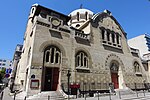Mouton-Duvernet (Paris Métro)
Paris Métro line 4Paris Métro stations in the 14th arrondissement of ParisParis Métro stubsRailway stations in France opened in 1909

Mouton-Duvernet (French pronunciation: [mutɔ̃ dyvɛʁnɛ]) is a Paris Métro station on line 4 in Paris' 14th arrondissement.
Excerpt from the Wikipedia article Mouton-Duvernet (Paris Métro) (License: CC BY-SA 3.0, Authors, Images).Mouton-Duvernet (Paris Métro)
Avenue du Général Leclerc, Paris Paris (Paris)
Geographical coordinates (GPS) Address Nearby Places Show on map
Geographical coordinates (GPS)
| Latitude | Longitude |
|---|---|
| N 48.832139 ° | E 2.330325 ° |
Address
Avenue du Général Leclerc 22
75014 Paris, Paris (Paris)
Ile-de-France, France
Open on Google Maps









